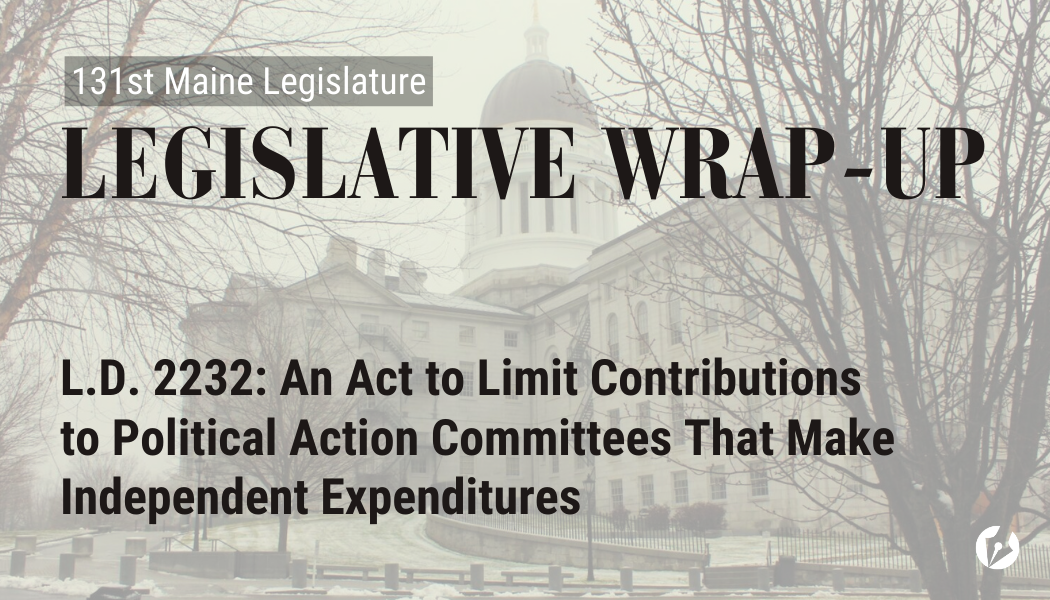Drafted by legal scholar Lawrence Lessig, this bill proposes a $5,000 cap on contributions from individuals, businesses and political action committees to super PACs that make independent expenditures.
Introduced as a citizen initiative, the bill was not enacted by the legislature but will appear as a statewide ballot measure in November.
In testimony before the Veterans and Legal Affairs Committee, Lessig explained that the bill addresses a question he believes is not answered by the Supreme Court’s decision in Citizens United v. FEC, a decision he said there is “zero chance” the court will change.
While Citizens United established that super PACs can spend unlimited amounts, Lessig and other proponents of the bill believe it does not address whether contributions to super PACs can be limited.
A report presented to the committee found that between 2010 and 2022, $2.3 billion was contributed to super PACs involved in Maine federal elections, and most contributions over $5,000 came from out-of-state donors.
Supporters of the bill expect it to be challenged in court, and hope it will be a way to curb the amount of dark money influencing elections.
Those testifying against, or neither for nor against the bill, raised concerns about the viability of the measure, and suggested putting forward a bill everyone expects to be challenged and potentially overturned by the courts is unfair to voters.
Read the full bill on the legislature’s website.
To get a better sense of the debate, here are some excerpts from testimony:
For:
“While contributions to political candidates to support their campaigns are currently regulated in terms of source and amount, contributions to so-called super PACs — that often make massive, unregulated independent expenditures in political campaigns — have not been effectively regulated here in Maine or elsewhere in the United States since shortly after the Supreme Court decided Citizens United v. FEC in 2010. The result of this lack of regulation has been huge increases in dark money contributions and expenditures designed to influence key races.” ~ Peter Murray, Portland
“The $5,000 amount was chosen because we thought, what amount would the people of Maine actually believe a politician could not be bought for or influenced by or corrupted by? Would one of our elected leaders in Maine — whether it be a state representative or state senator or even the governor — risk their good name and reputation and their job and even prison in exchange for a $5,000 campaign contribution or bribe? No, probably not. Would they risk it for $1 million? If we pass this law, we will never have to find out.” ~ Cara Brown McCormick, Maine Citizens to End Super PACs
“Democracies are very fragile and in our country today — regardless of your political beliefs — I think you can acknowledge that wealthy donors contributing to super PACs are one of the most corrupting and truly undemocratic forces that enjoys a grossly disproportionate share of influence over our election process.” ~ Adam Cote, Sanford
Against:
“We are once again facing the prospect of the voters of Maine being led to water by a questionable legal strategy. If this matter moves forward in its present form, the voters are going to be asked to vote for something that even the proponents agree is designed primarily to gin up a case to bring back to the courts based on an untried legal theory.” ~ Ben Grant, Maine Education Association
Neither for nor against:
“Citizens United, as it is currently understood to apply, would make this referendum question unconstitutional. I’m not opining on whether I think that’s good or bad, I’m just saying that within our system of laws and court opinions, the current understanding is that Citizens United in combination with Speechnow says that contributions or expenditures on [PACs that make] independent expenditures don’t qualify for this concern about quid pro quo corruption.” ~ Kate Knox, on behalf of Rebuild Maine
“We wholeheartedly support the aspirations of this bill, and believe the U.S. Constitution could and should be interpreted to sustain a functioning democracy, including allowing states and Congress to regulate money in politics. Because we are not as certain as the proponents of this legislation prevailing in this court, we testify neither for nor against.” ~ Will Hayward, Maine Citizens for Clean Elections







